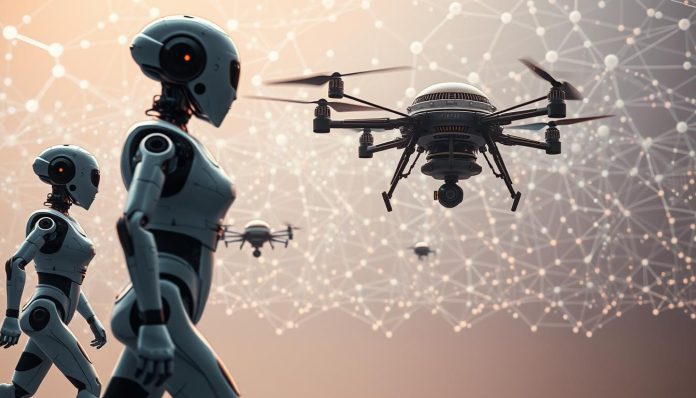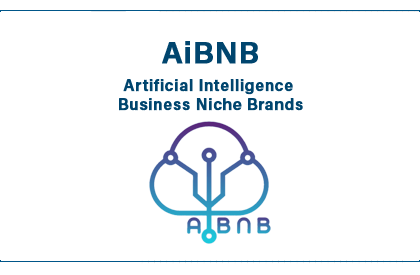Autonomous AI agents are revolutionizing the way businesses and research institutions operate. With 92% of companies planning to increase their investments in generative AI over the next three years, it’s clear that autonomous AI is becoming a key player in various industries. Autonomous AI agents can perform complex tasks with minimal human intervention, making them an attractive solution for companies looking to increase efficiency and productivity.
As autonomous AI agents continue to evolve, they are poised to transform various industries. The development and adoption of GenAI solutions have become more common over the past three years, indicating a trend towards increased integration in business practices. Autonomous AI agents are designed to perform goal-oriented actions with minimal human intervention, increasing efficiency and productivity. They can analyze data, make decisions, and execute tasks without waiting for human input, significantly reducing oversight requirements.
Key Takeaways
- 92% of companies plan to increase their investments in generative AI over the next three years.
- Autonomous AI agents can perform complex tasks with minimal human intervention.
- The development and adoption of GenAI solutions have become more common over the past three years.
- Autonomous AI agents are designed to perform goal-oriented actions with minimal human intervention.
- Autonomous AI agents can analyze data, make decisions, and execute tasks without waiting for human input.
- The technology must balance autonomy with predictability and safety, ensuring systems are reliable and trustworthy.
- AI agents in marketing can automate content creation, enhancing both efficiency and quality in marketing efforts.
Understanding Autonomous AI Agents
Autonomous AI agents are a type of artificial intelligence that can perform tasks independently, without human intervention. They utilize large language models to chain multiple thoughts together for achieving goals, making them ideal for applications where human oversight is not feasible. Autonomous AI agents can operate 24/7, significantly reducing labor costs for repetitive tasks.
These agents can be defined as systems that can perform goal-oriented actions with minimal human intervention, using advanced algorithms and machine learning models to analyze data, make decisions, and execute tasks. Autonomous AI agents are capable of learning, adapting, and operating in complex environments, making them suitable for various industries, including transportation, manufacturing, and healthcare.
AI automation plays a crucial role in the development of autonomous AI agents, enabling them to scale easily across applications without proportional increases in resources. Autonomous agents can manage customer interactions, execute algorithmic trading, and monitor transactions for fraud detection, among other tasks.
By leveraging autonomous AI agents, businesses can enhance productivity, scalability, and performance improvements across various industries. However, the implementation of autonomous agents requires careful planning, including defining clear objectives and assessing data infrastructure. With the right approach, autonomous AI agents can revolutionize the way businesses operate, making them more efficient and competitive in the market.
Recent Breakthroughs in AI Agent Technology
Recent advancements in AI agent technology have led to the development of more sophisticated autonomous AI agents. With the integration of machine learning and natural language processing, AI agents can now learn, adapt, and operate in complex environments, making them more effective and efficient. The development of agentic AI has enabled systems to perform complex tasks semi-autonomously, translating human intention into action and imposing minimal cognitive burden on the user.
The potential of AI agents is vast, with applications in various industries, including healthcare and customer service. As AI agents continue to evolve, they are likely to play a significant role in shaping the future of artificial general intelligence. With approximately 80% accuracy rate of current AI agents, there is still room for improvement to reach the 99% reliability required for critical business applications.
The use of AI agents is becoming increasingly prevalent, with 60% of people using virtual assistants like Alexa and Siri in their personal lives. As AI technology continues to advance, we can expect to see more widespread adoption of AI agents in various aspects of life, from business to education. With the projected market value of AI in healthcare expected to grow from $23.21 billion in 2023 to $187.95 billion by 2030, the potential for AI agents to make a significant impact is substantial.
How Autonomous AI Agents Are Transforming Business Operations
Autonomous AI agents are revolutionizing business operations by increasing efficiency and productivity. Companies are utilizing AI agents in customer service, handling complex customer queries, and troubleshooting issues without human intervention. This has led to a significant reduction in time to resolution for customer issues, resulting in improved customer satisfaction and loyalty.
AI agents are also being used in supply chain management, optimizing inventory levels, and predicting demand. The integration of AI in business operations is becoming more common, transitioning from supportive roles to critical operational functions. For instance, companies like Amazon utilize autonomous robots in warehouses, enhancing inventory management and order fulfillment accuracy and speed.
The use of AI automation in business operations has the potential to revolutionize various industries, from healthcare to finance. Autonomous AI systems in financial services analyze market data to identify profitable investment opportunities, effectively mitigating risks while maximizing returns. As AI agents continue to evolve, they will play an increasingly important role in transforming business operations, enabling companies to stay competitive and innovative in a rapidly changing market.
Revolutionary Applications in Scientific Research
Artificial general intelligence is transforming the scientific research landscape by enabling self-learning AI systems to analyze complex data and identify patterns. This technology has the potential to revolutionize various fields, from healthcare to environmental sustainability. In healthcare, AI can be used to design and adjust treatment plans tailored to individual needs, leading to improved patient outcomes.
The application of artificial general intelligence in scientific research can also expedite the process of drug discovery by analyzing molecular structures and predicting potential drug candidates. This can save researchers years of time and effort, allowing them to focus on more complex problems. Self-learning AI systems can also automate mundane tasks, enabling researchers to focus on innovative research and collaboration.
The integration of artificial general intelligence in scientific research can lead to a significant reduction in the time required to test hypotheses, potentially shortening research timelines by up to 30%. Additionally, AI-driven simulations can conduct experiments that would be impossible or impractical in a traditional laboratory setting, broadening the scope of scientific inquiry. As researchers continue to explore the potential of artificial general intelligence and self-learning AI systems, we can expect to see revolutionary applications in scientific research that transform our understanding of the world and improve our lives.
The Economic Impact of AI Agent Implementation
The implementation of autonomous AI agents is expected to have a significant impact on the economy, with both positive and negative effects. On one hand, AI automation can displace certain jobs, particularly in industries that rely heavily on knowledge-based roles. However, it can also create new job opportunities, especially in fields related to AI development and deployment.
According to recent statistics, the AI agent market is projected to grow from $5.1 billion in 2024 to $47.1 billion by 2030. This growth is expected to be driven by the increasing adoption of AI agents in various industries, such as healthcare, retail, and finance. The use of AI agents in these industries can enhance efficiency and innovation, leading to increased productivity and competitiveness.
The adoption of autonomous AI agents can also lead to significant economic benefits, including increased GDP and improved customer satisfaction. For example, AI agents can handle nearly 89% of repetitive documentation tasks, freeing up human workers to focus on more complex and high-value tasks. Additionally, AI agents can provide 24/7 access, faster responses, and simplified processes, making them an attractive option for customers.
However, the implementation of AI agents also requires careful consideration of their potential impact on jobs and the economy. While AI automation is expected to create 97 million new roles, it is also expected to displace 300 million jobs. Therefore, it is essential to establish guidelines for the ethical use of AI agents and develop new protocols for autonomous AI systems to ensure that their benefits are shared by all.
Ethical Considerations and Regulatory Framework
As autonomous AI agents become increasingly prevalent in various industries, it’s essential to address the ethical considerations and regulatory framework surrounding their development and deployment. The need for proper oversight and governance of autonomous AI agents is crucial, particularly in applications where human oversight is not feasible. Ensuring transparency and accountability is vital to prevent potential misuse or unintended consequences.
The regulatory framework surrounding autonomous AI agents is still evolving, but it’s essential to establish clear guidelines and standards to ensure they are used responsibly and for the benefit of society. For instance, the use of autonomous AI agents in encryption software raises concerns about compliance with U.S. export control laws, such as the Export Administration Regulations (EAR). The probability of regulatory breach when generating encryption code autonomously is significant, highlighting the need for compliance safeguards.
Effective governance and oversight are essential to ensure autonomous AI agents operate responsibly and in accordance with legal and organizational policies. This includes implementing functional guardrails to prevent AI agents from executing high regulatory risk tasks without explicit human approval. Additionally, legal context awareness in AI agents can help identify high-risk scenarios and trigger compliance prompts to avoid potential violations. By prioritizing ethical considerations and regulatory compliance, we can ensure that autonomous AI agents are developed and deployed in a responsible and beneficial manner.
Current Challenges Facing Autonomous AI Agents
Autonomous AI agents are transforming various industries, but they also face several challenges. One of the main challenges is balancing autonomy with predictability and safety. This requires ensuring that AI agents operate within established boundaries and do not pose a risk to humans or the environment. The integration of AI automation in workflows is expected to increase, with 70% of CIOs expressing optimism about the promise of AI agents in enhancing enterprise workflows.
Self-learning AI systems are becoming increasingly complex, making it essential to address the potential for job displacement and economic disruption. The management of multiple AI agents in workflows is also expected to increase in complexity as these agents learn and adapt based on varying data inputs. To mitigate these risks, 80% of organizations are projected to prioritize the establishment of clear frameworks for AI oversight and accountability.
The demand for advanced AI-specific management tools is rising, particularly to handle dynamic workloads and ensure compliance across multicloud environments. As the landscape of AI agent management evolves rapidly, startups like AgentOps and OneReach.ai are emerging to fill gaps left by larger cloud providers. The integration of AI agents into enterprise operations will require collaboration among the entire C-suite, highlighting the multifaceted nature of the challenge.
Success Stories: Leading Companies Using AI Agents
Several leading companies are already leveraging autonomous AI agents to enhance their operations and services. Companies like OpenAI, DeepMind, and Anthropic are at the forefront of developing AI agents that can function as virtual employees, handling tasks such as customer service, data analysis, and content creation.
For instance, OpenAI’s models enable businesses to integrate AI agents capable of answering complex questions and assisting in customer service. DeepMind’s research focuses on autonomous learning in AI agents, particularly in healthcare, where agents can process vast amounts of medical data for predictive analyses.
Moreover, companies like Amazon and Teneo are also utilizing AI agents to improve operational efficiency. Amazon’s Alexa for Business allows for the deployment of voice-activated agents that can handle tasks such as scheduling meetings and ordering supplies. Teneo’s orchestration platform enables organizations to create customized AI agents tailored to specific industry needs, enhancing customer interaction.
These success stories demonstrate the potential of autonomous AI agents to transform various industries and improve business outcomes. With the projected market value of AI agents expected to reach $47.1 billion by 2030, it’s clear that AI agents are becoming an essential tool for businesses looking to stay ahead of the curve.
The Role of Machine Learning in Agent Development
Machine learning plays a vital role in the development of autonomous AI agents, enabling them to learn, adapt, and operate in complex environments. Self-learning AI systems, in particular, have revolutionized the field by introducing automation and improving efficiency. The use of reinforcement learning and self-supervised learning has allowed AI agents to master tasks such as playing chess and Go, surpassing human champions.
AI automation has also been applied in various industries, including healthcare, finance, and logistics. For instance, AI agents can analyze medical images to detect conditions like cancer or fractures, while in finance, they can predict stock market trends and identify fraudulent activities. The integration of machine learning in agent development has enabled AI agents to process large datasets, identify patterns, and make predictions, making them essential for various applications.
The development of AI agents has also led to the creation of virtual assistants like Siri and Alexa, which utilize natural language processing to understand voice commands and perform tasks efficiently. As AI agents continue to evolve, they are expected to play a crucial role in transforming industries and improving operational efficiency. With the potential to revolutionize various sectors, self-learning AI systems and AI automation are poised to make a significant impact in the years to come.
Collaboration Between Human Workers and AI Agents
Autonomous AI agents have the potential to collaborate with human workers, augmenting their capabilities and improving productivity. By working together, humans and AI agents can achieve more than either could alone, particularly in complex tasks that require both human intuition and AI-driven analysis. According to Harvard Business Review, companies experience the most significant performance improvements when humans and AI enhance each other’s strengths rather than compete.
Research indicates that AI can predict mortality risk among hospital patients by analyzing electronic medical records, enabling timely interventions. The integration of AI in workflows has led to enhanced decision-making and productivity across various sectors, including healthcare and creative industries. Effective human-AI collaboration requires establishing clear roles, with AI handling repetitive tasks and humans focusing on critical thinking and ethical oversight.

Successful human-AI teams evolve based on user feedback and changing needs, leading to continuous improvement in AI performance. Metrics for evaluating human-AI collaboration include System Accuracy, Prediction Accuracy, Response Time, Error Reduction Rate, Confidence, Learning Curve, Task Completion Time, and Adaptability Score. The use of multi-modal AI systems allows for the simultaneous processing of text, voice, visuals, and data, enhancing human-AI interactions and paving the way for more efficient collaboration between human workers and AI agents.
Source Links
- The rise of autonomous AI: How intelligent agents are redefining strategy, risk & compliance – Thomson Reuters Institute
- The Rise of Autonomous AI Agents: Redefining Efficiency and Innovation
- Autonomous AI agents on the rise | TechTarget
- The Evolution of AI: Introducing Autonomous AI Agents – Shelf
- What Are Autonomous Agents?
- Are AI Agents the Next Step Towards Artificial General Intelligence? – The Quantum Record
- The Evolution of AI Agents: From Simple Programs to Agentic AI
- The Rise of Autonomous AI Agents: Transforming Business Operations
- The Future of Autonomous AI Agents in Business Operations
- AI’s Role in Revolutionizing Scientific Research
- OpenAI Unveils Deep Research: A Leap Toward AGI
- AI agents for complex autonomous searches
- The Economic Impact of AI Agents: Industry Transformation and Growth Forecast 2024–2030
- AI Agents Are a Door to Economic Growth; Policymakers Hold the Key
- The Ethical and Regulatory Risks of Autonomous AI: How Neuro Agents and Large Language Models…
- New Ethics Risks Courtesy of AI Agents? Researchers Are on the Case | IBM
- Preparing for the AI Agent Revolution: Navigating the Legal and Compliance Challenges of Autonomous Decision-Makers – StoneTurn
- IT leaders brace for the AI agent management challenge
- Challenges in Governing AI Agents
- 5 Companies Leading the Way in AI Agent Technology – Tene…
- AI Agent Revolution: Top 5 Industry Uses & Success Stories
- How AI Agents Work: The Intersection of Machine Learning and Human-Like Reasoning
- The 5 Levels of AI Agents: A Comprehensive Guide to Autonomous AI Syst
- What Are AI Agents? | IBM
- SmythOS – Effective Human-AI Collaboration Strategies for Enhanced Productivity and Innovation
- The Future of Digital Workers: Human and Bot Collaboration
- Frontiers | AI and Ethics When Human Beings Collaborate With AI Agents
- Bringing Droids into Business processes and Enterprise Systems
- AI Agents Powering Sustainable Generative AI: Reducing the Carbon Footprint of Data Pipelines
- The potential of using AI agents for sustainability




